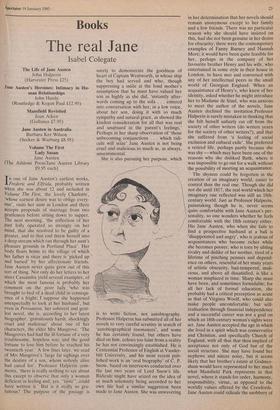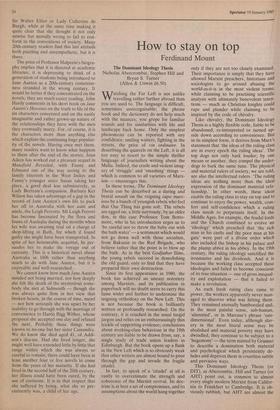Books
The real Jane
Isabel Colegate
The Life of Jane Austen John Halperin (Harvester Press £25)
hue Austen's Heroines: Intimacy in Hu- man Relationships John Hardy (Routledge & Kegan Paul £12.95)
Mansfield Revisited Joan Aiken (Gollancz £7.95) Jane Austen in Australia Barbara Ker Wilson (Secker & Warburg £8.95) Volume The First Lady Susan Jane Austen (The Athlone Press/Jane Austen Library
f9..95 each) In one of Jane Austen's earliest works, Frederic and Elfrida, probably written When she was about 12 and included in Volume The. First, the lovely Charlotte, 'whose earnest desire was to oblige every- one', visits her aunt in London and there accepts proposals of marriage from two gentlemen before sitting down to supper. The next morning, 'the reflection of her Past folly operated so strongly on her mind, that she resolved to be guilty of a greater, and to that end threw herself into a deep stream which ran through her aunt's Pleasure grounds in Portland Place'. Her body floats home to the village of which her father is vicar and there is 'picked up and buried' by her affectionate friends. Jane Austen never quite grew out of this sort of thing. Not only do her letters to her sister Cassandra yield several examples, of which the most famous is probably her comment on the poor lady 'who was brought to bed of a dead child in consequ- ence of a fright; 1 suppose she happened unexpectedly to look at her husband', but even in Persuasion, her soberest and gent- lest novel, she is, according to her latest biographer, 'gratuitously harsh, shockingly cruel and malicious' about one of her characters, the elder Mrs Musgrove. 'The Musgroves had had the ill fortune of a very troublesome, hopeless son; and the good fortune to lose him before he reached his twentieth year.' A few lines later, we read of Mrs Musgrove's 'large fat sighings over the destiny of a son, whom nobody alive had cared for'. Professor Halperin com- ments, 'there is really nothing to say about this except to observe that only a woman deficient in feeling and, yes, "taste", could have written it.' But is it really so gra- tuitous? The purpose of the passage is
surely to demonstrate the goodness of heart of Captain Wentworth, in whose ship the boy had served and who, though suppressing a smile at the fond mother's assumption that he must have, valued her son as highly as she did, 'instantly after- wards coming up to the sofa . . . entered into conversation with her, in a low voice, about her son, doing it with so much sympathy and natural grace, as showed the kindest consideration for all that was real and unabsurd in the parent's feelings.' Perhaps in her sharp observation of 'those unbecoming conjunctions . . . which ridi- cule will seize' Jane Austen is not being cruel and malicious so much as, as always, unsentimental.
She is also pursuing her purpose, which
is to write fiction, not autobiography. Professor• Halperin has submitted all of her novels to very careful scrutiny in search of 'autobiographical resonances', and some he has certainly found, but others have died on him, echoes too faint from a reality he has not convincingly established. He is Centennial Professor of English at Vander- bilt University, and his most recent pub- lished work is an 'oral biography' of C. P. Snow, based on interviews conducted over the last two years of Lord Snow's life. Ridicule might have seized on the idea of so much solemnity being accorded to her own life had a similar suggestion been made to Jane Austen. She was unwavering in her determination that her novels should remain anonymous except to her family and a few friends. There was no particular reason why she should have insisted on this, had she not been genuine in her desire for obscurity; there were the contemporary examples of Fanny Burney and Hannah More; it would have been quite feasible for her, perhaps in the company of her favourite brother Henry and his wife, who entertained in some style in their house in London, to have met and conversed with any of her intellectual peers in the small world of Georgian England. When an acquaintance of Henry's, who knew of her identity, asked whether he might introduce her to Madame de Stael, who was anxious to meet the author of the novels, Jane Austen declined the invitation.Professor Halperin is surely mistaken in thinking that she felt herself unfairly cut off from the society of other writers (do writers yearn for the society of other writers?), and that she suffered from 'a feeling of social exclusion and cultural exile'. She preferred a retired life, perhaps partly because she was shy — which may have been one of the reasons why she disliked Bath, where it was impossible to go out for a walk without the possibility of meeting an acquaintance.
The shyness could be forgotten in the creation of an imaginary world, easier to control than the real one. Though she did not die until 1817, the real world'which her imaginary one reflected was still an 18th- century world. Just as Professor Halperin, painstaking though he is, never seems quite comfortable with Jane Austen's per- sonality, so one wonders whether he feels comfortable with the 18th century either. His Jane Austen, who when she fails to find a prospective husband at a ball is 'disappointed and angry', who is jealous of acquaintances who become richer while she becomes poorer, who is torn by sibling rivalry and dislike of her mother, tired of a lifetime of pinching pennies and depend- ence on others, resentful of her many years of artistic obscurity, bad-tempered, mali- cious, and above all dissatisfied, is like a woman misplaced in time. Sharp she must have been, and sometimes formidable; for all her lack of formal education, she probably had a critical perception as acute as that of Virginia Woolf, who could also make people uncomfortable; but self- realisation through financial independence and a successful career was not a goal on which an 18th-century woman's sights were set. Jane Austen accepted the age in which she lived in a spirit which was conservative and Christian, and specifically Church of England, with all that that then implied of acceptance not only of God but of the social structure. She may have found her nephews and nieces noisy, but it seems likely that her brother's estate at Godmer- sham would have represented to her much what Mansfield Park represents in that novel, where it stands for order, harmony, responsibility, virtue, as opposed to the worldly values offered by the Crawfords. Jane Austen could ridicule the snobbery of Sir Walter Elliot or Lady Catherine de Burgh, while at the same time making it quite clear that she thought it not only unwise but morally wrong to fail to con- form to the conventions of society. Many 20th-century readers find this last attitude both puzzling and unsympathetic, but it is there.
The price of Professor Halperin's biogra- phy implies that it is directed at academic libraries; it is depressihg to think of a generation of students being introduced to Jane Austen as a 20th-century conscious- ness stranded in the wrong century. It would be better if they concentrated on the novels; they are much easier reading. John Hardy comments in his short book on Jane Austen's Heroines on the truth to life of the six characters concerned and on the easily imaginable and rather grown-up nature of the relationships they have with the men they eventually marry. For, of course, it is the characters more than anything else which explain the continuing huge popular- ity of the novels. Having once met them, many readers want to know what happens to them after the end of the stories. Joan Aiken has worked out a pleasant sequel in Mansfield Revisited, with Fanny and Edmund out of the way seeing to the family interests in the West Indies and Fanny's younger sister Susan taking her place, a good deal less submissively, as Lady Bertram's companion. Barbara Ker Wilson has taken advantage of a gap in the record of Jane Austen's own life to pack her off to Australia with her aunt and uncle, the Leigh Perrotts. Mr Leigh Perrott has become fascinated by the flora and fauna of Australia during the months when his wife was awaiting trial on a charge of shop-lifting in Bath, for which if found guilty she might have been transported. In spite of her honourable acquittal, he per- suades her to make the voyage out of curiosity. This is a historical novel about Australia in 1806 rather than anything much to do with Jane Austen, but it is enjoyable and well-researched.
We cannot know how much Jane Austen minded not being married, nor how deeply she felt the death of the mysterious some- body she met at Sidmouth — though she was always quite firm in her view that broken hearts, in the course of time, mend — nor how seriously she was upset by her inability to go through with the marriage of convenience to Harris Bigg Wither, whose proposal she accepted one day and refused the next. Probably these things were known to no-one but her sister Cassandra. We do know she died aged 41, of Addi- son's disease. Had she lived longer, she might well have extended little by little that range within which she was always so careful to remain; there could have been at least another four or five novels to come from the years of her maturity. If she had lived in the second half of the 20th century, her illness could have been cured, by the use of cortisone. It is in that respect that she suffered by being, what she so pre- eminently was, a child of her age.











































 Previous page
Previous page